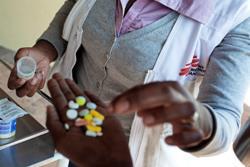Villagers get water after 20 dry years

However, several weeks after Nkomazi Mayor Johan Musa Mkhatshwa was sworn in, he has made service delivery a priority – and high on his list was to ensure that the people of Mgobodzi had running water so they would no longer have to share local steams with animals for drinking, washing and cooking.
Community elder Sarah Ngobeni said she was grateful. “From now on I will enjoy my pension because I will no longer use it to buy water, which I was supposed to be provided for free by the municipality.”
Accountable
Resident Andries Khoza said the reason the community has lived without clean water for so long was that no one in the municipality was ever held accountable. “And now a new mayor comes and things start to happen. Our prayer is that he will continue to bring service delivery to the communities, especially to the villages because this is where people are struggling the most.”
Nkomazi Municipality spokesperson Cyril Repinga said the Mgobozi water shortage had been placed high on the agenda and people in most of the area were now getting water.
“There is another intervention project that has been completed and water is now pumping into the reservoir. There is another project that will start soon and will augment this current project,” he said.
Author
Republish this article
This work is licensed under a Creative Commons Attribution-NoDerivatives 4.0 International License.
Unless otherwise noted, you can republish our articles for free under a Creative Commons license. Here’s what you need to know:
You have to credit Health-e News. In the byline, we prefer “Author Name, Publication.” At the top of the text of your story, include a line that reads: “This story was originally published by Health-e News.” You must link the word “Health-e News” to the original URL of the story.
You must include all of the links from our story, including our newsletter sign up link.
If you use canonical metadata, please use the Health-e News URL. For more information about canonical metadata, click here.
You can’t edit our material, except to reflect relative changes in time, location and editorial style. (For example, “yesterday” can be changed to “last week”)
You have no rights to sell, license, syndicate, or otherwise represent yourself as the authorized owner of our material to any third parties. This means that you cannot actively publish or submit our work for syndication to third party platforms or apps like Apple News or Google News. Health-e News understands that publishers cannot fully control when certain third parties automatically summarise or crawl content from publishers’ own sites.
You can’t republish our material wholesale, or automatically; you need to select stories to be republished individually.
If you share republished stories on social media, we’d appreciate being tagged in your posts. You can find us on Twitter @HealthENews, Instagram @healthenews, and Facebook Health-e News Service.
You can grab HTML code for our stories easily. Click on the Creative Commons logo on our stories. You’ll find it with the other share buttons.
If you have any other questions, contact info@health-e.org.za.
Villagers get water after 20 dry years
by cynthiamaseko, Health-e News
August 30, 2018



